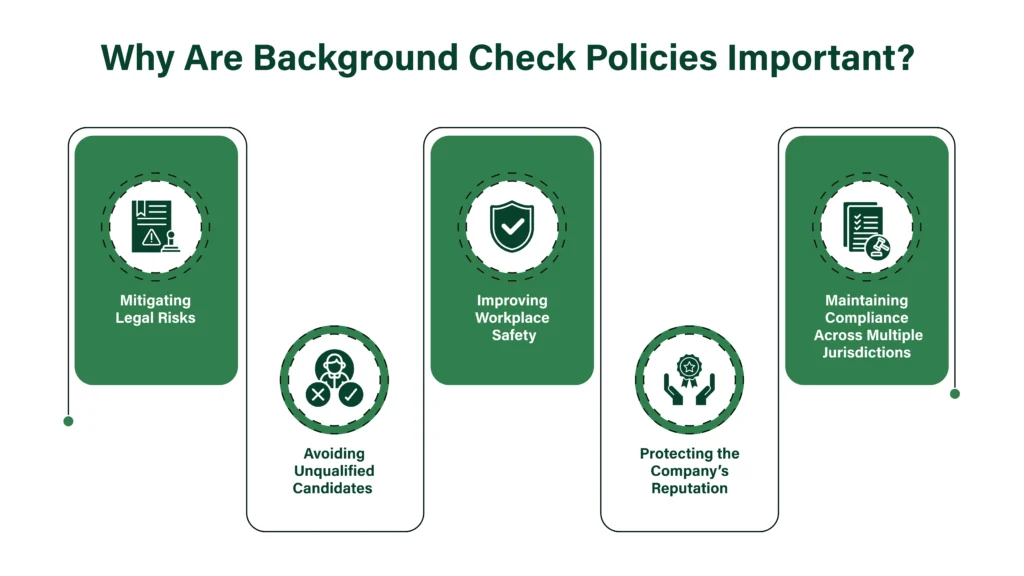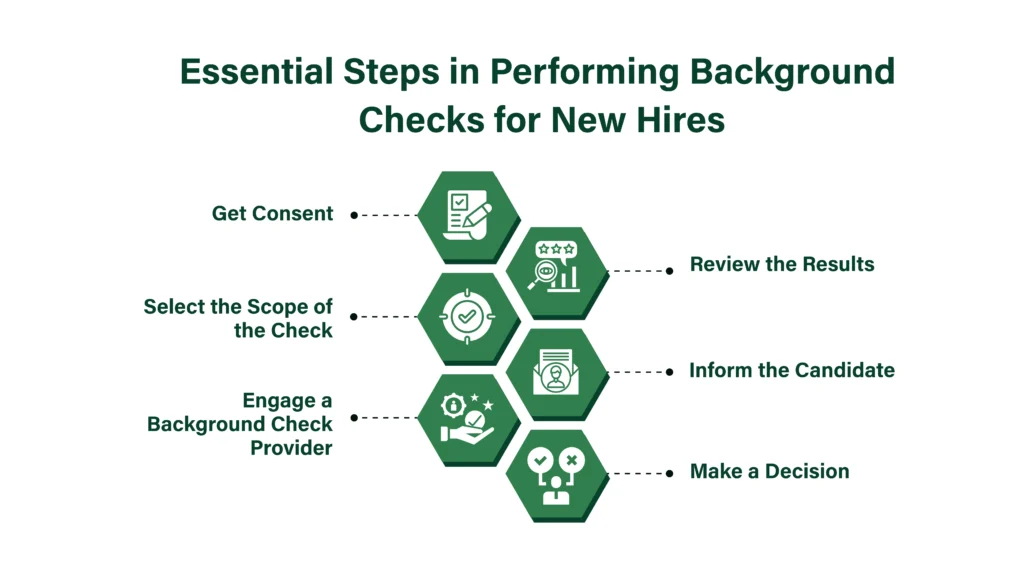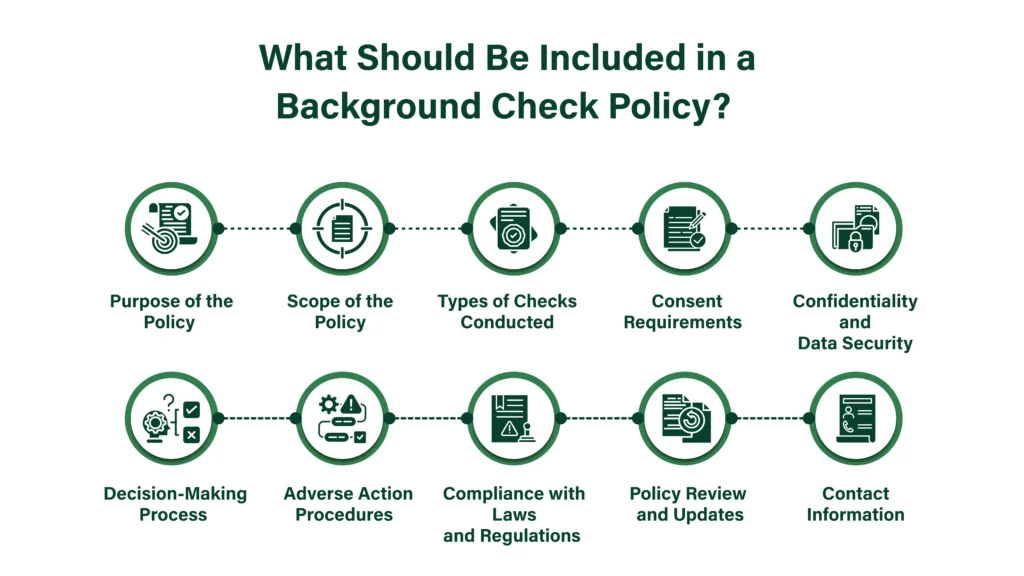According to a recent report, 95% of companies surveyed stated that background checks are essential to their hiring process. However, as we move to 2025, many organizations still struggle to implement comprehensive background check policies that comply with evolving laws and industry trends.
The consequences of a poorly executed or outdated background check policy can be severe, ranging from legal ramifications to hiring unqualified candidates, leading to workplace disruptions or even safety risks. According to a study, nearly 43% of employers reported being impacted by a bad hire due to insufficient background screening. Additionally, most companies have experienced a bad hire that costs them over 30% of the said employer’s annual salary.
All these numbers emphasize the urgent need for clear, updated policies that protect employers and employees. This guide will help you navigate the trends, common challenges, and essential elements you must know about in 2025 to protect your business and develop a safe, compliant working environment.
Why Are Background Check Policies Important?

A well-structured policy ensures that every step in the background check process is consistent, legal, and practical, providing a clear framework for screening potential employees. Here’s why having a comprehensive background check policy is critical for organizations:
1. Mitigating Legal Risks
Without a formalized background check policy, businesses risk overlooking critical compliance requirements. Legal frameworks governing background checks, such as the Fair Credit Reporting Act (FCRA) and state-specific regulations, mandate that organizations follow strict guidelines when conducting screenings.
A background check policy ensures that these verifications are conducted fairly and within the bounds of the law, reducing the risk of penalties or legal action.
2. Avoiding Unqualified Candidates
One primary purpose of a background check policy is to ensure that new hires meet the organization’s standards for the role. A well-defined policy helps confirm that an applicant’s education, employment history, and qualifications are valid, reducing the chances of hiring individuals unsuited for the position.
Additionally, a policy ensures that all candidates are held to the same standards, making the hiring process more equitable and transparent. Such consistency also builds trust with employees, knowing that their colleagues have gone through a thorough vetting process.
3. Improving Workplace Safety
A firm background check policy is essential in maintaining a secure workplace. By including checks for criminal history, businesses can identify any potential risks posed by new hires before they enter the workforce. This is especially important in healthcare, education, or finance industries, where employee trust and safety are critical.
4. Protecting the Company’s Reputation
A poorly executed hire can cause internal disruption and damage a company’s reputation. Whether it’s due to criminal activity, poor performance, or misrepresentation of credentials, the impact of a bad hire can extend far beyond internal operations.
A background check policy ensures that every step is taken to prevent such hires, preserving the organization’s reputation both within the industry and with the public.
5. Maintaining Compliance Across Multiple Jurisdictions
Background check requirements vary widely depending on local laws for organizations operating in multiple states or countries. A clear and adaptable policy helps ensure the company remains compliant across all jurisdictions. By incorporating legal research into the policy creation process, businesses can stay ahead of regulatory changes and avoid costly fines or sanctions.
6. Data Accuracy and Dispute Resolution
The policies will ensure that the data requested is accurate and allow for dispute resolution. Employers are responsible for ensuring the accuracy of the information used in background checks. The FCRA mandates that employers implement reasonable procedures to guarantee maximum accuracy when reporting information from consumer background checks. Relying on outdated or incomplete databases can result in non-compliance and possible legal consequences.
Furthermore, employers must provide candidates with a clear process to dispute any inaccuracies in the background check reports. Under the FCRA, if an applicant identifies incorrect or incomplete information in the report, they must be allowed to challenge it. Employers must notify candidates of their rights to dispute inaccuracies and offer a reasonable period for review before taking any adverse action based on the report. This ensures fairness and transparency in the hiring process.
7. Confidentiality and Data Security
Background check policies ensure confidentiality and data security. Employers must maintain the confidentiality of background check information and implement appropriate data security measures to protect sensitive data. FCRA obligates employers to ensure that background check results are handled carefully and not disclosed to unauthorized parties. Employers must establish secure systems for storing and transmitting this information, including encrypted digital files and secure physical storage for paper records.
Data security measures should also include strict access controls, ensuring only authorized personnel have access to the background check information. Employers should also have protocols to safely dispose of or destroy sensitive data once it is no longer needed, such as shredding paper documents and securely deleting electronic records. By adhering to these best practices, employers help protect their candidates’ privacy and organization from potential data breaches or security risks.
Essential Steps in Performing Background Checks for New Hires

Here’s how to conduct a background check with vital information:
1. Get Written Consent
Under the Fair Credit Reporting Act (FCRA), employers must provide a clear and conspicuous disclosure to candidates when they plan to conduct a background check. This disclosure must be separate from other documents, ensuring that the applicant is fully aware of and consents to the background check process. Here’s what you need to know:
- Clear and Conspicuous: The disclosure must be easily understood by the applicant. It should be written in simple language and not be buried in a larger document. The purpose is to ensure the candidate knows that a background check will be conducted during the hiring process.
- Separate Document: The disclosure must be provided on a separate document from the employment application or other materials. This helps avoid confusion and ensures that the applicant is fully aware of what they consent to. The document should focus solely on the background check and not include any other unrelated information.
- Content of the Disclosure: The disclosure must explicitly state that the employer intends to obtain a consumer report or background check and that the information may be used in the hiring decision. It should be clear that the background check will involve reviewing the applicant’s criminal history, credit report, or other relevant data.
- Written Consent: The candidate must provide written consent after receiving the disclosure. Depending on how the disclosure is provided, this consent can be obtained through a signature or by checking a box on an electronic form.
- Timing: The disclosure must be provided before the employer conducts the background check. It should not be part of the hiring process until the applicant has given their explicit consent. Employers cannot run the background check before receiving the applicant’s authorization.
2. Select the Scope of the Check
Employers will determine which checks are necessary based on the role. A job involving financial management may prioritize credit checks, while a position in child care will focus on criminal history and social responsibility.
3. Engage a Background Check Provider
Many businesses rely on third-party providers to conduct background checks. These providers gather and verify information from various public and private databases, ensuring accuracy and compliance with applicable laws.
4. Review the Results
Once the background check is completed, the employer reviews the findings to assess whether the candidate meets the necessary standards. This step involves comparing the information in the report to the claims made by the candidate during the hiring process.
5. Inform the Candidate
If any issues are found during the background check that may affect the hiring decision, the employer must inform the candidate and provide them with a copy of the report. This allows the candidate to dispute inaccuracies before making a final decision.
6. Make a Decision
After all checks are reviewed and disputes are resolved, the employer can make an informed hiring decision. Whether the candidate is cleared for hire or rejected based on the findings, following a structured background check process ensures the decision is fair and legally compliant.
Types of Background Checks
- Employment History Check verifies the candidate’s past roles, tenure, and responsibilities. Employers may contact previous employers to confirm details or use databases to validate employment claims.
- Criminal Record Check uncovers any past convictions or pending legal issues that may pose a risk to the company or its employees. These checks are essential for roles that involve sensitive information, financial handling, or safety responsibilities.
- Educational Verification ensures that the candidate’s academic qualifications match their claims. It is essential for roles that require specific degrees or certifications.
- Credit History Checks are relevant for finance positions. This verification helps assess a candidate’s financial responsibility and track record, which could impact their suitability for managing company assets or finances.
- Driving Record Checks are essential for roles that involve driving. This check verifies whether the candidate has a valid driver’s license and reviews their driving history for violations or accidents.
Social Media and Online Presence Check to ensure their online behavior aligns with the company’s values.
What Should Be Included in a Background Check Policy?

Creating a comprehensive background check policy ensures consistency, compliance, and clarity in hiring. A well-structured policy helps organizations protect themselves from legal risks while fostering a fair and transparent hiring environment.
Here are the significant components to include in a background check policy:
1. Purpose of the Policy
Clearly state the objectives of the background check policy, emphasizing the importance of ensuring a safe and qualified workforce. This section should outline how background checks contribute to the organization’s mission and values.
2. Scope of the Policy
Define who the policy applies to, specifying whether it covers all job candidates, specific positions, or employees undergoing promotions or transfers. Clarifying the scope helps manage expectations and ensures everyone understands when background checks will be conducted.
3. Types of Checks Conducted
List the specific types of background checks that may be performed, such as:
- Criminal record checks
- Employment history verification
- Educational qualifications verification
- Credit history checks (if applicable)
- Driving record checks (if relevant)
This section should explain the rationale for each type of check and its relevance to specific roles.
4. Consent Requirements
Detail the process for obtaining written consent from candidates before conducting background checks. This includes informing candidates of their rights under relevant laws, such as the Fair Credit Reporting Act (FCRA) and state-specific regulations.
5. Confidentiality and Data Security
Outline measures to protect the confidentiality of the information obtained during background checks. This includes specifying who has access to the data, how it will be stored, and how long it will be retained. Ensuring data security builds trust with candidates and safeguards sensitive information.
6. Decision-Making Process
Describe how the organization will use the information obtained from background checks in the hiring process. Include guidelines on how findings will be evaluated and the criteria used to determine whether a candidate is disqualified based on their background.
7. Adverse Action Procedures
The Fair Credit Reporting Act mandates that employers follow a two-step process when deciding to take adverse action.
Step 1: Pre-Adverse Action
Before an employer can take any adverse action based on the results of a background check, they must notify the candidate of their intention and give them a chance to respond.
- Provide a Copy of the Background Check Report
- Provide a Summary of the Candidate’s Rights under the FCRA
- Notify the Candidate of the Intent to Take Adverse Action
- Document the Pre-Adverse Action Process
Step 2: Adverse Action
The employer must give the candidate a reasonable period to review the background check and dispute any incorrect information. The FCRA does not specify an exact timeframe, but be sensible. This time allows the candidate to challenge the findings, correct errors, or provide additional context.
Once the employer has allowed the candidate time to respond, the employer must review any disputes or clarifications provided by the candidate.
If the decision to take adverse action remains unchanged, the employer must send a final notice to the candidate. This notice must inform the candidate of the following:
- The decision to take adverse action: The employer must explain that the decision was made based on the background check report and the information provided.
- The candidate’s right to dispute the information: The candidate must be informed that they can dispute the accuracy or completeness of the information.
- Contact Information of the Reporting Agency: If a third-party consumer reporting agency provides the report, the employer must include the agency’s name, address, and phone number.
- Employer’s Role: The notice should state that the employer, not the agency, decided to take the adverse action and that the reporting agency cannot provide reasons for the employer’s decision.
Note: The employer must retain a copy of the final adverse action notice and document the date it was sent. If the background check was outsourced to a third-party agency, the employer must also keep a record of the agency’s contact details.
8. Compliance with Laws and Regulations
Ensure that the policy includes a commitment to comply with all relevant federal, state, and local laws regarding background checks. This section should reference applicable regulations like the FCRA, Equal Employment Opportunity Commission (EEOC) guidelines, and state-specific background check laws.
9. Policy Review and Updates
Include a statement about the regular review and potential updates of the background check policy to keep it aligned with changing laws, regulations, and organizational needs. This ensures that the policy remains relevant and effective over time.
10. Contact Information
Provide contact information for individuals within the organization responsible for overseeing the background check process. This allows candidates and employees to ask questions or seek clarification about the policy.
Top 7 Challenges in Implementing Background Checks
Implementing a background check policy can be a crucial part of an organization’s hiring process, but it also comes with its share of challenges. Understanding these hurdles can help employers manage the complexities of background screening while ensuring compliance and maintaining fairness. Here are some common common issues in background checks:
1. Compliance with Regulations
Background check laws vary significantly between federal, state, and local jurisdictions. Staying compliant with these regulations is essential, as failure to do so can lead to legal repercussions. Organizations must be aware of:
- The Fair Credit Reporting Act (FCRA) requirements
- State-specific laws regarding what can be checked
- Regulations on candidate notification and consent
2. Data Accuracy and Reliability
The effectiveness of background checks largely depends on the accuracy and reliability of the data collected. Employers may encounter challenges such as:
- Incomplete or outdated information from public records
- Variations in data reporting from different sources
- Errors in reporting that could lead to wrongful disqualification of candidates
Ensuring the accuracy of background check data is critical, as mistakes can harm candidates and expose organizations to legal liabilities.
3. Candidate Privacy Concerns
Candidates may feel uncomfortable with the extent of the information being collected or fear that their privacy is being violated. Organizations must balance thoroughness with respect for individual privacy rights by:
- Communicating what information will be checked
- Obtaining informed consent
- Implementing strict data security measures to protect sensitive information
Failure to address these concerns can damage the employer’s reputation and erode trust with potential hires.
4. Costs and Resource Allocation
Conducting comprehensive background checks can be costly, especially for small businesses. Costs can accumulate from:
- Third-party screening services
- Administrative time spent managing the process
- Potential litigation resulting from disputes over background check findings
Organizations must assess their budgets and allocate resources effectively while ensuring that the background check process does not become a financial burden.
5. Managing Candidate Expectations
Candidates often have differing expectations regarding the background check process. Some may not understand the necessity of specific checks, while others may be concerned about how their past could affect their job prospects. Employers need to:
- Educate candidates about the background check process and its importance
- Be transparent about the types of checks being conducted and how the information will be used
Clear communication can help mitigate concerns and manage expectations throughout the hiring process.
6. Handling Discrepancies
Discrepancies between the information provided by candidates and the results of background checks can create challenges. Employers must have procedures in place to:
- Verify any conflicting information
- Address candidates’ disputes regarding inaccurate findings
A lack of clear procedures can frustrate candidates and employers, potentially resulting in lost talent or legal complications.
7. Integration with Existing HR Processes
Integrating background checks into existing human resources processes can be complicated. Organizations must ensure that their background check policies align with other HR practices, such as onboarding and compliance training. This requires:
- Coordination between HR teams and background check providers
- Streamlined workflows to ensure efficiency
The background check process may become cumbersome without proper integration, leading to delays and potential hiring challenges.
Background Check Laws 2025
As we move into 2025, understanding the importance of background check laws is essential for employers and job seekers.
1. Fair Credit Reporting Act (FCRA) Compliance
The FCRA remains a foundational law that regulates the use of consumer reports, including background checks. Critical provisions for employers in 2025 include:
- Informed Consent: Employers must obtain written consent from candidates before conducting background checks. This requirement emphasizes the need for transparency in the hiring process.
- Disclosure of Information: Candidates must be informed if adverse actions (e.g., not hiring) are based on information from a background check. Employers must provide candidates with a copy of the report and a summary of their rights.
- Dispute Process: Candidates have the right to dispute inaccurate information. Employers are required to investigate these disputes and respond appropriately.
2. Ban the Box Legislation
Many states and local jurisdictions continue implementing “Ban the Box” laws, prohibiting employers from asking about a candidate’s criminal history on initial job applications. In 2025, these laws may expand in scope:
- Delayed Disclosure: Employers must wait until later in the hiring process to inquire about criminal records, allowing candidates to be evaluated based on their qualifications first.
- State Variability: Compliance requirements vary significantly from state to state, so employers must stay informed about local laws to avoid legal complications.
Employers must be aware of and comply with varying state and local laws regarding background checks. These laws regulate when and how employers can inquire about an applicant’s criminal history during the hiring process.
“Ban the Box” laws prohibit employers from asking about criminal convictions on job applications, aiming to give individuals with criminal records a fair chance at employment. However, these laws vary by jurisdiction, with different states, cities, and counties implementing their rules. Some laws may require delaying criminal background checks until later in the hiring process, such as after an initial interview or once a conditional offer of employment has been extended.
Employers must stay updated on the specific requirements in their jurisdiction to avoid non-compliance, which could lead to legal challenges or fines. This includes ensuring that background checks are conducted under state laws that may impose stricter limitations than federal regulations.
3. Data Privacy Laws
As data privacy concerns grow, several states are enacting or enhancing privacy laws that affect background checks:
- California Consumer Privacy Act (CCPA): This law grants consumers rights regarding their personal information, including the right to know what data is collected and how it is used. Employers must ensure that their background check processes align with these requirements.
- General Data Protection Regulation (GDPR) Considerations: Although primarily applicable in the European Union, U.S. companies doing business in the EU must comply with GDPR, which has strict guidelines on data handling, consent, and individual rights.
4. Focus on Criminal Justice Reform
There is an increasing push for criminal justice reform, influencing background check policies:
- Record Sealing and Expungement: Many states are implementing laws that make it easier for individuals to seal or expunge criminal records. Employers must be aware of these changes to avoid discrimination against candidates who have taken steps to address their past.
- Limitations on Reporting Timeframes: Some jurisdictions limit the time frame during which criminal convictions can be reported, emphasizing the importance of considering candidates’ rehabilitation and growth.
5. Industry-Specific Regulations
Specific industries may face additional regulations regarding background checks:
- Healthcare and Education: Due to the sensitive nature of their work, employers in these sectors often have stricter background check requirements. These can include checks for specific licenses, certifications, and criminal histories related to child or patient safety.
- Financial Services: Given the fiduciary responsibilities involved, background checks for positions in finance may include more extensive credit checks.
6. Changes in Federal Guidelines
The federal government continues to update its guidelines regarding employment discrimination and background checks:
- EEOC Guidance: The Equal Employment Opportunity Commission (EEOC) emphasizes that blanket policies excluding all individuals with criminal records may be discriminatory. Employers are encouraged to evaluate the nature and gravity of the offense in relation to the job.
Safeguard Your Workforce with Verification Screening Solutions’ Background Checks

At Verification Screening Solutions, we provide a comprehensive suite of services to help you navigate the complexities of background check trends in 2025.
Our comprehensive services include:
- County Level Criminal Search
- Statewide Criminal Search
- Federal Criminal Search
- Multi-State Criminal Search
- Motor Vehicle Report (MVR)
- Sex Offender Search
- Federal Civil Search
- County Level Civil Search
- SSN Trace
- Employment Verification
- Education Verification
- Fingerprinting
Don’t leave your background check policies to chance. Discover how our customized services can help you establish effective and compliant policies that protect your organization while securing qualified candidates.

